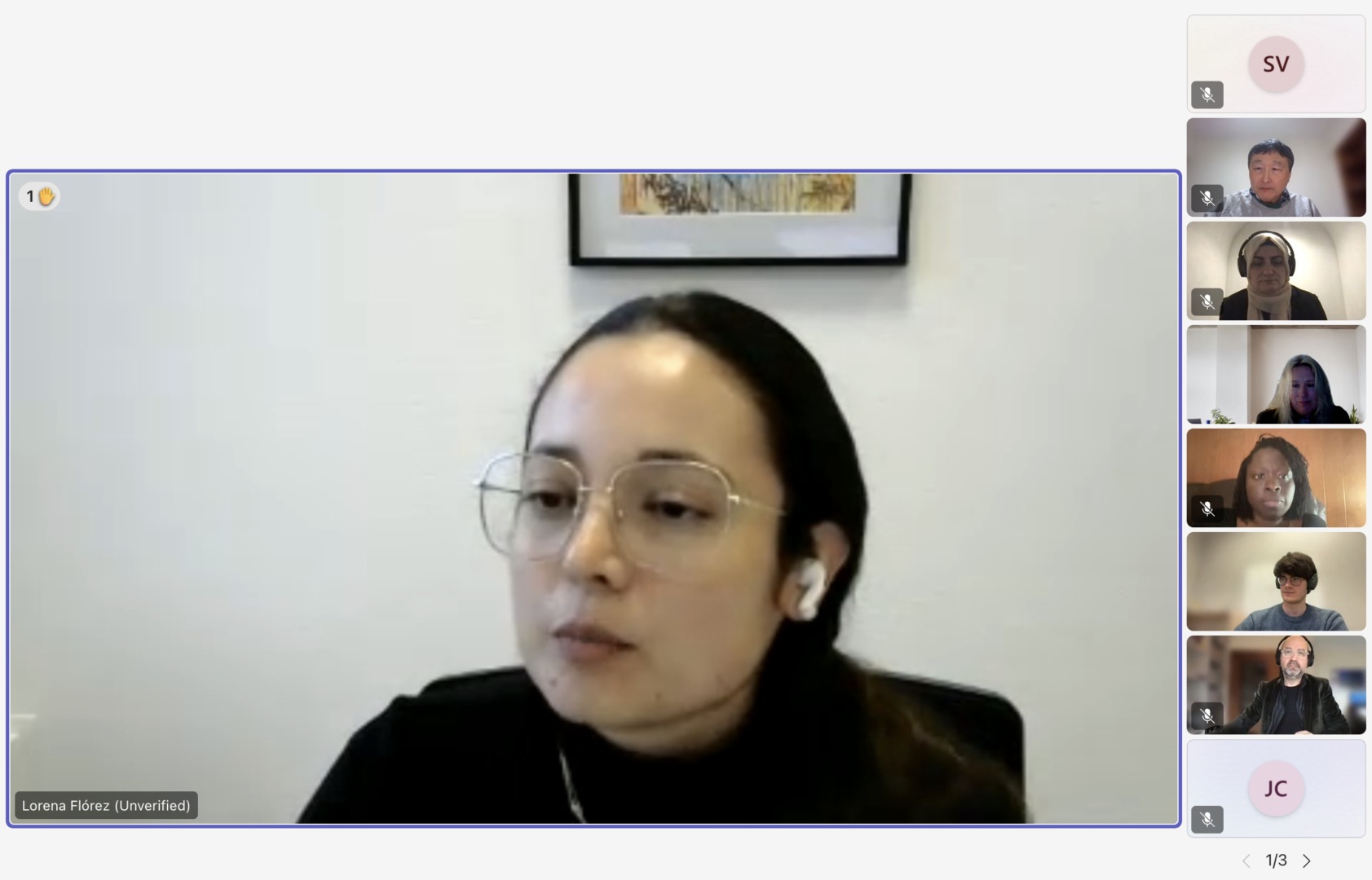January’25 Fireside Chat
Event Summary
On 29 January, 2025, we hosted the third session of our monthly Fireside Chat series, featuring Dr.Keegan McBride from the Oxford Internet Institute. The session was chaired by Dr. Johanna Walker from King’s College London, who also serves as a member of the Area 3 Committee. Dr. McBride presented insights from his recent work, The Rise of Tech-Enabled States , focusing on how governments worldwide are leveraging digital infrastructure to enhance resilience. The discussion explored key challenges, including geopolitical competition, sustainability concerns, and the environmental costs of AI-driven governance.
Discussion Highlights
1. The Evolution of Tech-Enabled States:
- Digital Transformation as a Necessity: Dr. McBride emphasised that digitalisation is no longer optional for governments. States must adopt digital infrastructure to remain relevant and effective in the 21st century. This includes leveraging technologies like AI, blockchain, and IoT to improve public service delivery, policy-making, and crisis response.
- COVID-19 as a Catalyst: The pandemic highlighted the importance of digital readiness. Countries with robust digital infrastructures, such as Estonia, were able to maintain government operations and deliver services seamlessly during lockdowns, while others struggled.
- Beyond Efficiency: Digitalisation is not just about efficiency; it is about reimagining the role of the state. For example, AI can enable proactive public services, such as predictive healthcare based on genetic data and wearable devices.
2. Geopolitical Implications of Digitalisation:
- The Internet’s Dual Role: Initially seen as a tool for democratisation and liberation, the Internet has been effectively co-opted by authoritarian regimes to consolidate power. High Internet penetration in countries like China demonstrates how digital tools can be used for surveillance, censorship, and control.
- Soft Power and Influence: Early adopters of digital governance, such as Estonia, have gained significant soft power. For instance, Estonia’s e-governance model has attracted interest from larger nations like India, which seek to replicate its success.
- Tech as a Geopolitical Tool: Digital infrastructure is increasingly becoming a battleground for geopolitical influence. The U.S. and China are competing to export their digital models, with China’s Digital Silk Road and the U.S.’s dominance in cloud computing and AI.
3. Resilience and Vulnerabilities:
- Physical Vulnerabilities of Digital Infrastructure: While digital systems enhance resilience, they also introduce new risks. For example, during the Ukraine conflict, Russian forces targeted Ukrainian data centers to disrupt government operations. This underscores the need for robust backup systems, such as Estonia’s data embassies.
- Cloud-Based Governance: Dr. McBride discussed the potential for running entire governments from the cloud, even in cases where physical territory is lost (e.g., due to rising sea levels in Tuvalu or Kiribati). This requires international legal frameworks to recognize digital embassies and cloud-based sovereignty.
- Remote Work and Crisis Management: The ability to operate governments remotely, as demonstrated during COVID-19, is a key aspect of resilience. However, this requires investment in secure digital tools and infrastructure.
4. Public-Private Dynamics:
- Dominance of Tech Giants: Companies like Amazon, Google, and Microsoft play a critical role in providing digital infrastructure. However, their dominance raises concerns about dependency, especially for smaller nations without domestic alternatives.
- Balancing Act: Governments must strike a balance between leveraging private sector innovation and maintaining control over critical infrastructure. For example, the U.S. relies heavily on NVIDIA for AI compute power, but export controls and geopolitical tensions complicate this relationship.
- Ethical and Regulatory Challenges: The increasing integration of private sector technologies into governance raises ethical questions about data privacy, accountability, and transparency. The need for robust regulatory frameworks to address these issues was highlighted.
5. AI and Compute Power:
- U.S. Dominance in AI: The U.S. leads in AI development due to its control over compute resources (e.g., NVIDIA GPUs) and capital. This dominance is reinforced by export controls and investments in AI infrastructure.
- Emerging Alternatives: Technologies like DeepSeek challenge the narrative that AI development requires massive compute power. By optimizing for memory-bound devices, DeepSeek demonstrates that innovation can occur even with limited resources.
- Global Implications: The U.S.’s compute dominance creates dependencies for other nations, particularly in Europe and the Global South. The regional collaborations and investments in domestic capabilities are essential for reducing this dependency.
6. Sustainability and Environmental Impact:
- Environmental Costs of Digitalisation: Data centers consume vast amounts of water and energy, raising concerns about sustainability. Protests in Chile and Uruguay over data center water usage highlight the social and environmental trade-offs of digital infrastructure.
- Federated Learning as a Solution: Decentralized systems, such as federated learning, offer a more sustainable alternative by distributing compute tasks across smaller devices. This approach is particularly relevant for regions with limited infrastructure, such as sub-Saharan Africa.
- Renewable Energy Investments: Tech companies are investing in renewable energy sources, such as Microsoft’s exploration of nuclear power. However, the environmental impact of these investments remains a contentious issue.
7. Global South and Digital Sovereignty:
- Extractive Dynamics: The Global South often faces extractive practices in digital infrastructure projects, where foreign companies build data centers or networks without considering local environmental or social impacts. For example, protests in Chile and Uruguay have highlighted the disproportionate water usage of data centers.
- Digital Sovereignty: Developing domestic tech capabilities is crucial for reducing dependency on foreign companies. Regional alliances, such as the collaboration between Singapore and Rwanda on AI governance, offer a pathway for smaller nations to assert their sovereignty.
- Balancing Development and Sustainability: Countries in the Global South must navigate the trade-offs between digitalization and environmental preservation. For example, satellite-based internet projects in the Amazon have been halted due to concerns about environmental damage.
We look forward to the next session in our Fireside Chat series, where we will continue to explore important topics in our field.
Reading materials:
- Government Resilience in the Digital Age
- The Effects of Chinese Investments on Digital Development and Data Sovereignty in Southeast Asia: A Case Study of the Philippines
- Aardvark weather: end-to-end data-driven weather forecasting
- The Supply Chain of AI: the environmental impact of AI and the need to reconsider algorithmic harms
- State of Compute Access 2024: How to Navigate the New Power Paradox
- China’s Digital Silk Road and Africa’s Technological Future
- Open Source AI: The Overlooked National Security Imperative






